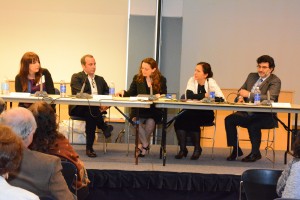- About Ramapo
- Academics
- Admissions & Aid
- Student Life
- Athletics
- Alumni
- Arts & Community
- Quick Links
- Apply
- Visit
- Give
PANEL DISCUSSED ISLAMICIZED ARMENIAN WOMEN AND ORPHANS IN TURKEY IN WAKE OF ARMENIAN GENOCIDE
(PDF) (DOC) (JPG)October 9, 2014
(MAHWAH, NJ) – On October 8, 2014, The Center for Holocaust and Genocide Studies sponsored a panel discussion on the experiences of the children and grandchildren of the women and orphans who were Islamicized during the Armenian Genocide. Today, these individuals are increasingly reasserting their intertwined religious and ethnic identities as Christians and Armenians. The generous support of the Armenian National Committee-New Jersey helped make the program possible. More than 170 students and community members attended the event.
The program, entitled Islamicized Armenian Women and Orphans and the [Re]emergence of Armenian Identities in Turkey A Century after the Armenian Genocide, covered a broad range of perspectives. Through narratives, interviews, photos and personal histories, the panelists developed a framework for what constitutes new Armenian identities in light of the increasing prevalence of Islamicized Armenians reclaiming their former heritage.
The panel members were:
- Ishkhan Chiftjian, who teaches at Hamburg University, Germany. He focussed on genocide, language and collective identity. He is the editor of two books, Voices from Germany and New Voices from Germany, both in German. The books include interviews with, and articles by, German scholars about the Armenian Genocide.
- Rakel Dink, the widow of slain Turkish-Armenian journalist and activist Hrant Dink. She related her own experience growing up in a family of the Varto clan. Although never forgetting its Armenian Christian roots, the clan escaped persecution by assimilating into the surrounding Kurdish population.
- Elyse Semerdjian, Associate Professor of Islamic World/Middle Eastern History at Whitman College. She expanded on the findings of her acclaimed book, Off the Straight Path: Illicit Sex, Law, and Community in Ottoman Aleppo. She explored the connections between ethno-religious identity, persecution, and changing borders as they relate to the collective memory of the Armenian Genocide in Turkey and Syria.
- Marc Sinan, was born in Germany to a Turkish-Armenian mother and a German father. He related his personal and musical journey to the fate of his grandmother, Ani, who was “Islamicized” during the Armenian Genocide. Appearing on international concert stages since his youth, Sinan is a much-admired guitarist and composer. Tellingly, much of his work explores musical traditions of peoples (Armenians, Kurds and Turks) who have inhabited the space of what is today eastern Turkey.
- Ani Tchaghlasian, who served as the moderator, is a member of the Center’s Advisory Board.
Following the above program that also included a lively Q&A, Professor Stephen Rice, Dean of the Salemeno School of Humanities and Global Studies, on behalf of the Board of Trustees, the President, faculty, staff and students of Ramapo College presented Ms. Dink with a “Commendation for Rakel and Hrant Dink (posthumous) for Outstanding Devotion to Human rights and Social Justice.” This presentation capped what was a very moving and highly informative evening.
E-News Archives
| 2023 | 2022 | 2021 | 2019 | 2018 | 2017 | 2016 | 2015 | 2014 | 2013 | 2012 | 2011 | 2010 | 2009 | 2008 | 2007 |Copyright ©2025 Ramapo College Of New Jersey. Statements And Policies. Contact Webmaster.


Follow Us!